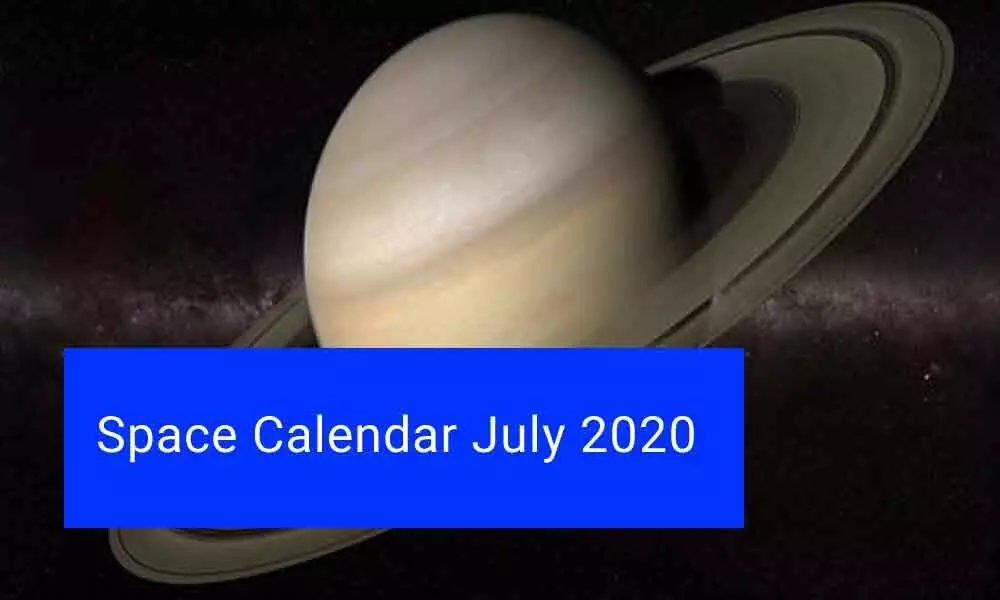Space Calendar July 2020: Events Occurring in Space
 Space Calendar July 2020
Space Calendar July 2020Space Calendar July 2020: Make yourself aware of what's happening in the sky this month, July 2020.
These dates are subject to change. Launch dates are taken from Space.com.
July 1: NASA astronauts Chris Cassidy and Bob Behnken will take a 7-hour spacewalk outside the International Space Station beginning at 7:35 a.m. EDT (1135 GMT). Watch it live.
July 3: Rocket Lab will launch an Electron rocket on a rideshare mission from the Mahia Peninsula in New Zealand. The mission, which Rocket Lab has nicknamed "Pics Or It Didn't Happen," will launch the CE-SAT-IB Earth-imaging satellite for Canon Electronics, five SuperDove Earth observation CubeSats for Planet, and the Faraday 1 CubeSat for In-Space Missions. It will lift off at 5:13-6:03 p.m. EDT (2113-2203 GMT).
July 4: Happy Aphelion Day! Earth is farthest from the sun today.
July 4-5: A penumbral lunar eclipse will be visible from the Americas and parts of Africa and Antarctica. The moon will begin passing through Earth's shadow on July 4 at 11:07 p.m. EST (0307 GMT on July 5), and the eclipse will last for 2 hours and 45 minutes.
July 5: The full moon of July, known as the Buck Moon, occurs at 12:44 a.m EDT (0444 GMT). That same day, the moon will be in conjunction with Jupiter at 5:38 p.m. EDT (2138 GMT). The moon will also be in conjunction with Saturn on July 6 at 4:38 a.m. EDT (0838 GMT). The trio will form a small triangle in the night sky before fading into the dawn.
July 8: The "morning star" Venus is at its greatest brightness for the year, shining at magnitude -4.5 in the morning sky.
July 11: The waning, gibbous moon will make a close approach to the Red Planet in the early morning sky. It will be in conjunction with Mars at 3:38 p.m. EDT (1938 GMT).
July 14: The United Arab Emirates plans to launch its first Mars orbiter, the Hope Mars Mission. It will launch from the Tanegashima Space Center in Japan on a Japanese H-2A rocket, at 4:51 p.m. EDT (2051 GMT).
July 14: Jupiter reaches opposition, which means the planet will appear at its biggest and brightest. This happens about once a year when Jupiter's position is almost directly opposite the sun in the sky. Around the same time, Jupiter will also make its closest approach to Earth.
July 15: The U.S. Air Force will use a Minotaur 4 rocket to launch a classified spy satellite cargo for the U.S. National Reconnaissance Office. Dubbed NROL-129, the mission will lift off from NASA's Wallops Flight Facility in Virginia.
July 17: The waning crescent moon will be in conjunction with Venus, the "morning star," at 3:27 a.m. EDT (0727 GMT). Look for the pair above the eastern horizon before dawn.
July 20: New moon
July 20: Saturn reaches opposition, which means the planet will appear at its biggest and brightest. This happens about once a year when Saturn's position is almost directly opposite the sun in the sky. Around the same time, Saturn will also make its closest approach to Earth.
July 22: NASA's Mars 2020 rover launches to the Red Planet! It will lift off on a United Launch Alliance Atlas V rocket from Cape Canaveral Air Force Station in Florida. Watch it live.
July 23: China plans to launch an orbiter and a small rover to Mars. The mission, called Tianwen 1, will lift off on a Long March 5 rocket from the Wenchang Spacecraft Launch Site in Hainan, China.
July 23: A Russian Soyuz rocket will launch the 76th Progress cargo spacecraft to the International Space Station. It will lift off from the Baikonur Cosmodrome in Kazakhstan, at 10:26 a.m. EDT (1426 GMT). Watch it live.
July 30: A Russian Proton rocket will launch the Express 80 and Express 103 communications satellites for the Russian Satellite Communication Company. It will lift off from the Baikonur Cosmodrome in Kazakhstan.
Also scheduled to launch in July (from Spaceflight Now):
A SpaceX Falcon 9 rocket will launch the Anasis 2, or KMilSatCom 1, a communications satellite for the South Korean military, from Cape Canaveral Air Force Station in Florida.
Source: SPACE.com














